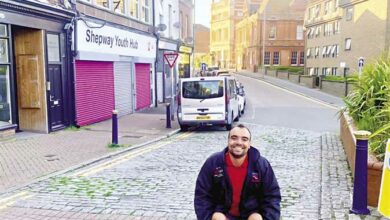“My mobility is restricted in my legs, other than that I’m a completely normal person,” Fatma Seif, head of Human Resources at the Ministry of Electricity, says.
“But how am I expected to reach my full potential and give back to a society that doesn’t even acknowledge me or guarantee my most basic rights?” Seif, who suffers from infantile paralysis, asks.
Egyptians with special needs have long struggled for tangible respect and equal rights in order to participate fully in society. A draft law set forth last month aims to improve their circumstances, but special needs associations say the law falls short of their demands.
Past laws supporting people with special needs ended up merely being ink on paper without any realization on the ground, says Gharib Suleiman, executive director of the Houqouqi Association for People with Disabilities.
“What will the law do in a country that doesn’t respect the rule of law and in which those with special needs are perceived as a burden on society?” he asks.
The draft law was issued by the Ministry of Insurance and Social Affairs, which said that the law would be put before civil society organizations and special needs associations for comment. However, the heads of both associations interviewed by Egypt Independent denied being contacted by the ministry, and there have been no press reports of a consultative meeting of any kind.
Taxes
The law exempts special needs persons from all taxes, including customs and sales taxes. While other special needs associations hailed this clause, Suleiman deems it “useless.”
“Around 90 percent of Egyptians with special needs live under the poverty line and can’t afford to travel or buy anything from abroad,” he says.
There are no solid statistics regarding the number of people with special needs in Egypt. However, UNICEF estimates the percentage of disabled persons to be 11 percent or more, around 8.5 million people. Suleiman believes the real figure to be around 12 million.
Mohamed Salah, director of the Lasta Wahdak (You Are Not Alone) Association for people with special needs, says that the poor statistics are a result of Egyptians who are reluctant to admit that they have people with disabilities in their families.
“In some villages they consider it a shame or a sign of weakness and refuse to admit it,” he explains.
The law also offers tax exemptions on any establishment that serves those with special needs or completes renovations to improve disabled access.
Suleiman argued that even the Ministry of Insurance and Social Affairs, which supposedly serves citizens with special needs, doesn’t facilitate easy access.
“You need to climb around 35 flights of stairs to get inside the Ministry of Insurance. Do you think other facilities, especially private ones would, pay a dime to accommodate the needs of special needs persons because of a tax exemption?” he asks.
Transportation
Egypt, with its poor transportation system, jagged streets and deteriorating government facilities, is considered an unfriendly environment for disabled people, who can sometimes feel trapped in their own homes. Seif uses crutches to get around the hectic city of Cairo and she never ventures to go out alone at night, out of fear that she might stumble on something and fall down in the dark streets with no aid.
“It’s dark, the streets are crooked and not all of them are lit at night — if I stumble on so much as a small stone, I can fall on my back,” she says.
“I don’t want people having to pick me up and carry me around. If the streets were suitable for me I wouldn’t need to depend on anyone,” she adds assertively.
If passed into law, the bill would require the reservation of seats for special needs persons on all public transportation, while reducing the fees by 50 percent. Critics say this would do little in a transportation system that doesn’t provide ramps or even acknowledge people with special needs.
“The only way I can get on any kind of public transportation is by climbing up on my hands and knees. Where’s the dignity in that?” asks Seif.
Seif saved up to buy a car two years ago and adjusted it with a simple gadget to help her use the pedals after she became fed up with paying hefty taxi fares because public transportation won’t accommodate her condition.
“But there are other disabled people who can’t afford to buy a car or take a taxi,” she adds. “How are they expected to lead a normal life?”
Work
The law would guarantee that persons with special needs must represent five percent of the workforce in any public or private employer with at least 25 employees, amending the 1975 Rehabilitation of Disabled Persons Law which set the minimum number at 50.
The law also increases the penalty on those who violate the law, stipulating a prison sentence of up to three months or a fine between LE1,000 and LE3,000, or both.
Seif argues that government institutions got around the old law through bureaucracy and loopholes, preventing its implementation.
Salah believes that many business owners would prefer to pay the fine rather than hire five percent of the work force from persons with special needs because “it’s cheaper than building ramps and renovating their establishments to accommodate them.”
He adds that in some cases, people with special needs are given a small monthly salary to stay at home.
Suleiman echoes Salah, saying that business owners are convinced that persons with disabilities are less productive than others. “We need to have a vision on how to make use of the abilities of people with disabilities in production,” he says.
Salah believes that there were more pressing issues that needed to be addressed, including decent free health care.
“Health care for people with special needs is usually very expensive and most of them can’t afford it,” he says. ‘“Without free healthcare, some are at risk of death.”
The law also reserves at least five percent of government housing for married persons with special needs who can’t afford accommodation.
Seif, who previously received an apartment through government housing, says it was “inhumane” and located “45 kilometers away from Cairo,” making it difficult for her to get to work.
“The apartment was 58 square meters and it was in such bad shape that you could see through the cracks in the walls and huge lizards came out from the holes in the floor,” she says, adding that the government refused to give them contracts for the apartments.
She felt “unsafe” and “insecure” in the apartment, which was located at the end of the Nahda area in Medinat al-Salam, an area she describes as “infested with thugs and burglars.”
Some clauses in the draft law provide “special treatment” to persons with special needs, such as allowing them a paid one-hour leave earlier than the rest of the employees. However, special needs persons described this as a “disadvantage” that deprives them from being treated equally in the work place.
“One of my main demands is to be treated the same as everyone else at my work. In order to make that happen I have to prove that I’m as productive as the next person,” Seif says.
She points out that in some cases, persons with disabilities exert double the effort to do the same job due to their condition, but “this is our challenge,” adding that this could be compensated with bonuses or other “less discriminatory methods.”
In April, the Cabinet, headed by Kamal al-Ganzoury, passed a law to establish the National Council on Disability to represent the interests of disabled people. However the presidential election and Cabinet reshuffle this summer delayed the council’s work.
“We will start next month,” says the council’s media coordinator, Ahmad Emad, who adds that the draft law hasn’t been proposed or discussed with the council yet.
However, Prime Minister Hesham Qandil, who heads the council, held a meeting with its board members last month to discuss its responsibilities, authorities, headquarters and other issues related to the rights of disabled persons.
The Giza governor, Mokhtar al-Hamalawy, announced on Thursday that the headquarters of the council would be located inside the general bureau of the governorate, according to state news agency MENA.
The Council’s members consist of around 12 government officials, including nine ministers, in addition to 17 representatives of persons with special needs and a number of other prominent actors and public figures, according to council member Tarek Sabry.
Seif and Salah slammed the council, saying that it didn’t truly represent them.
“Why does the council include so many ministers and politicians who don’t understand what we go through?” Salah asks.
However, Emad vehemently disagreed, saying that the council would guarantee the rights of persons with special needs.
“People with special needs have huge potential, and they can perform miracles if they have officials who listen to them and guarantee their rights,” Seif says.




